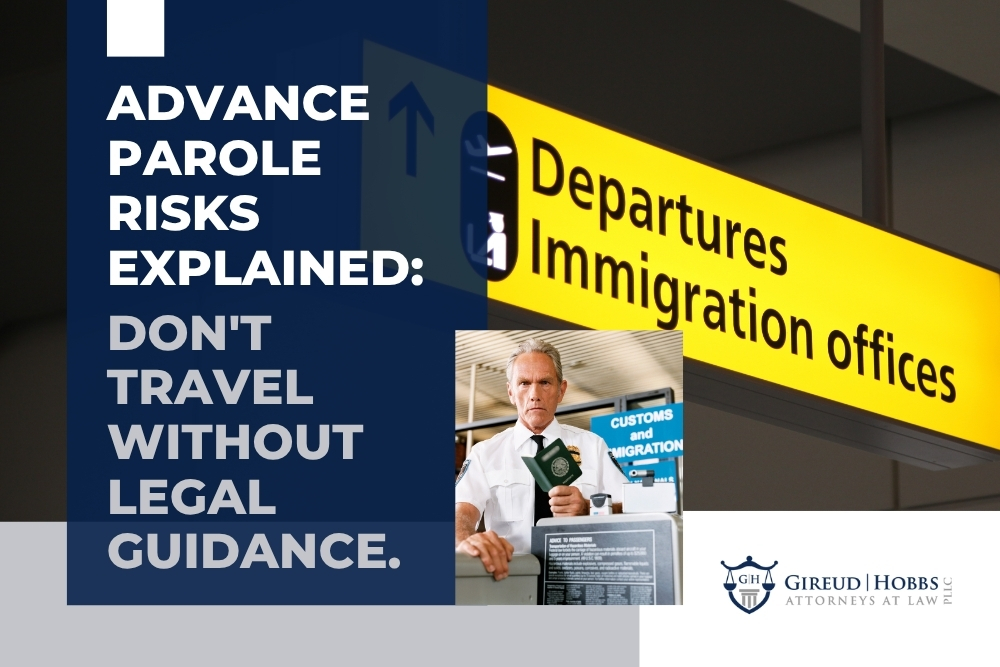Advance parole allows certain immigrants to travel abroad while their application is pending. They can leave the U.S. temporarily and return without jeopardizing their immigration status.
If you’re unsure whether advance parole applies to your situation or want to understand how it works, this guide will explain how you could be eligible, the application process, advance parole processing times, and more.
Table of Contents
Request A Free Consultation Today!
Request A Free Consultation Today!
What is Advance Parole?
Advance parole is an official travel document issued by U.S. Citizenship and Immigration Services (USCIS). It permits certain immigrants to travel outside of the United States and return without being viewed as abandoning their pending application for immigration benefits, such as a green card.
Traveling outside the U.S. while awaiting a green card decision without advance parole may lead USCIS to consider your application abandoned and deny approval or even re-entry. With processing times for green cards lasting months or even years, advance parole is a critical safeguard to travel due for personal, professional, or emergency reasons.

Emergency Advance Parole
You can apply for emergency advance parole when urgent travel is needed, such as to visit a critically ill loved one or attend a funeral abroad.
Emergency requests require documentation such as medical reports or death certificates to prove the urgency. These requests are evaluated case-by-case, and while approval isn’t guaranteed, USCIS may expedite processing if the circumstances warrant it.
Who Can Apply for Advance Parole?
While advance parole is most commonly associated with green card applicants, other categories of immigrants may also qualify.
- Adjustment of status applicants
- Applicants for Temporary Protected Status (TPS)
- Applicants for Asylum Status
- T or U Visa Holders
- DACA beneficiaries
Request A Free Consultation Today!
What is the Advance Parole Application Process?
Step 1: Gather Required Documents
- Two recent passport-style photos.
- A copy of your valid passport or Employment Authorization Document (EAD).
- A clear copy of your application receipt notice.
- Evidence supporting your need to travel, especially for emergency advance parole.
Step 2: Submit Form I-131
Submit Form I-131 (Application for Travel Documents, Parole Documents, and Arrival/Departure Records) to USCIS. They will send a receipt notice to inform you they received your application and will process it.
Step 3: Wait to Receive Your Advance Parole Document
If USCIS approves your Form I-131 application, they will mail your advance parole document, which is typically valid for one year. Carry this document when traveling and present it at customs when re-entering the U.S.
Work Authorization
If you applied for advance parole and employment authorization (Form I-765) alongside your green card application, your employment authorization will be processed and prioritized before advance parole. USCIS processes these requests separately to enhance efficiency.
Request A Free Consultation Today!
Risks While Applying for Advance Parole
Advance parole carries several risks. One is the possibility of being denied entry, which could jeopardize your plans to re-enter the United States. A valid advance parole document unfortunately does not guarantee that you will be granted re-entry to the U.S.
Traveling before receiving approval may result in the abandonment of certain applications, such as adjustment of status, which can lead to potential complications or loss of eligibility. Additionally, unexpected delays in processing could disrupt important travel plans and impact obligations with work, family, or emergencies.

Applicants subject to bars of inadmissibility or with unresolved immigration issues may also face challenges at reentry, including denial at the border. It is crucial to provide accurate, thorough documentation to minimize risks and avoid potential legal consequences.
You may consult an immigration attorney to help you deal with any challenges that may arise during the application process and avoid removal.
How Long is the Advance Parole Processing Time?
The standard advance parole processing time may range between 90 to 120 days from the submission date of Form I-131. However, factors such as application volume, USCIS service center workloads, and case complexity can delay decisions.
For those seeking emergency travel authorization, expedited requests may be processed faster if properly justified.
To monitor your application progress, USCIS provides an online case status tracker where you can view updates in real-time.
What To Do If USCIS Denies Your Advance Parole Application
Receiving a denial for advance parole can be frustrating. Here are common reasons behind receiving a denial from USCIS for advance parole:
- Insufficient evidence supporting your need for travel.
- Errors or incomplete information on Form I-131.
- Failure to meet eligibility criteria.
If denied, carefully review the denial notice provided by USCIS, which will explain why they rejected your application. Applicants generally have the following options:
- File a Motion to Reopen or Reconsider (if applicable).
- Reapply with additional documentation correcting prior deficiencies.
We highly recommend you find an experienced immigration attorney to help you assess your options and compile a stronger, error-free application.
Do You Need Legal Assistance for Advance Parole?
Our San Antonio attorneys specialize in immigration law and are dedicated to helping individuals apply for advance parole. If you need assistance or legal advice regarding a pending visa application, reach out to Gireud | Hobbs, PLLC. Contact us today for a consultation, and we’ll help you get started on your application.

